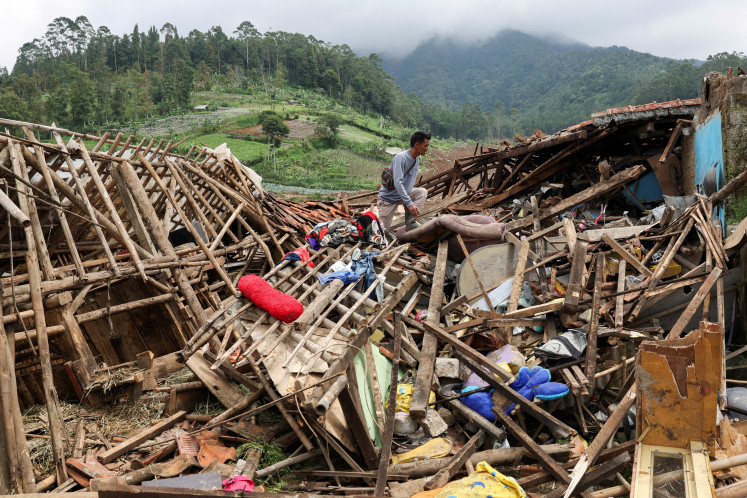Popular Reads
Top Results
Can't find what you're looking for?
View all search resultsPopular Reads
Top Results
Can't find what you're looking for?
View all search resultsLand conversions outpace farm creation
It appears the government will miss its target of attaining food self-sufficiency this year, as data shows the nation of 240 million people is becoming increasingly dependent on imports to meet its surging dietary needs
Change text size
Gift Premium Articles
to Anyone
I
t appears the government will miss its target of attaining food self-sufficiency this year, as data shows the nation of 240 million people is becoming increasingly dependent on imports to meet its surging dietary needs.
Through its food self-sufficiency program, President Susilo Bambang Yudhoyono's administration aims to boost domestic food production, including staples like rice, soybeans and sugar, in order to meet 90 percent of domestic demand. The remaining 10 percent would be reserved for imports.
According to data from the Cabinet Secretariat, last year Indonesia imported around 1.5 million tons of soybeans and 3.26 million tons of sugar, equal to roughly 60 percent and 54 percent of domestic needs, respectively.
Indonesian Farmers Union (SPI) chairman Henry Saragih blamed the reliance on imported food on the lack of available farmland.
'What we see now is that a lot of farmland is being converted into housing or industrial estates, many of which may not have yet been recorded,' he said, adding that around 100,000 hectares (ha) of farmland were converted for non-agricultural purposes each year.
Data from the Agriculture Ministry revealed that total farmland conversion amounted to 330,000 ha between 2009 and 2011.
Agriculture Minister Suswono said previously that land conversion mainly affected soybean and sugarcane farmland, leading to inadequate domestic supplies of soy and sugar.
'Soybean production fell to 0.81 million tons last year, down 3.5 percent, or 0.84 million tons in 2012,' he said, adding that local demand for soybeans had reached 2.5 million tons per year.
Domestic production of sugar, meanwhile, stood at 2.54 million tons last year, far below the national demand of 5.8 million tons.
Suswono said that the country's rice production in 2013 was sufficient to meet domestic demand, but that a number of private companies still imported special varieties of rice not produced in the country.
Henry added that if land conversion continued and dependency on food imports continued to climb, Indonesia risked losing its identity as an agricultural country.
Of the nation's 191 million ha of land, just 4.3 percent, or 8.1 million ha have been specially designated as farmland, a figure far below the 31.84 million ha categorized as farmland in Thailand, according to data from the Indonesian Chamber of Commerce and Industry (Kadin).
'What the government needs to do is to allocate more land for agricultural plants instead of export commodities like palm oil,' Henry said, adding that some plantation and forest areas could be converted into farmland.
Henry said that Indonesia ideally should have more than 50 million ha of farmland.
The Agriculture Ministry's land management director Prasetyo Nuchsin said recently that his ministry had created new farmland areas in recent years, but that it could not keep up with land conversion rates.
Between 2006 to 2013, the Agriculture Ministry created 40,000 ha of farmland. During the same period, land conversion rates stood at about 100,000 ha per year, he said.
Bogor Agricultural University (IPB) management and business graduate program director Arief Daryanto said recently that faced with the farmland shortages, biotechnology offered the best hope for boosting Indonesia's agricultural capacities.










